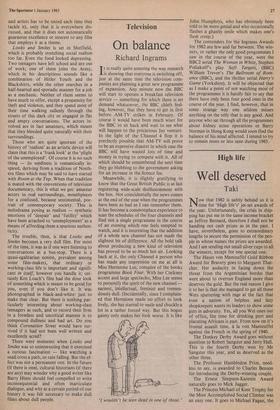Television
On balance
Richard Ingrams
Tt is really quite amusing the way research
is showing that everyone is switching off, just at the same time the television com- panies are planning a great new programme of expansion. Any minute now the BBC will start to operate a breakfast television service — something for which there is no demand whatsoever, the BBC chiefs feel- ing, however, that they have to get in first before AM-TV strikes in February. Of course it would have been much wiser for the BBC to sit back and wait to see what will happen to the precarious Jay venture. In the light of the Channel 4 flop it is prerfectly possible that AM-TV will prove to be an expensive disaster in which case the BBC will have wasted lots of time and money in trying to compete with it. All of which' should be remembered the next time they go blubbing to the government asking for an increase in the licence fee.
Meanwhile, it is slightly gratifying to know that the Great British Public is at last registering wide-scale disillusionment with the box. Not coincidentally the news comes at the end of the year when the programmes have been as bad as I can remember them. It has become a commonplace experience to scan the schedules of the four channels and find not a single programme in the course of an evening which one feels tempted to watch, and it is interesting that the addition of a whole new channel has not made the slightest bit of difference. All the bold talk about producing a new kind of television has proved to be so much hot air. Looking back at it, the only Channel 4 person who has made any impression on me at all is Miss Hermione Lee, compere of the books programme Book Four. With her Cockney accent and large spectacles, Miss Lee seems to personify the spirit of the new channel — earnest, intellectual, feminist and tremen- dously dull. (Incidentally, since I complain- ed that Hermione made no effort to look lively, she has started to smile and chuckle a lot in a rather forced way. But this bogus gaiety only makes her look worse. It is like '1 wouldn't be seen dead in one of those.' John Humphrys, who has obviously been told to be more genial and who occasionally flashes a ghastly smile which makes one's flesh creep.)
The contenders for the Ingrams Awards for 1982 are few and far between. The win- ners, or rather the only good programmes I saw in the course of the year, were the BBC2 serial The Woman in White, Stephen Poliakoff's play Soft Targets; (BBC) William Trevor's The Ballroom of Rom- ance (BBC), and the thriller serial Harry's Game (Yorkshire). It will be objected that as I make a point of not watching most of the programmes it is hardly fair to say that there have only been four good ones in the course of the year. I find, however, that in some strange way one seldom misses anything on the telly that is any good. And anyone who sat through all the programmes about kidney stone operations or Barry Norman in Hong Kong would soon find the balance of his mind affected. I intend to try to remain more or less sane during 1983.


































 Previous page
Previous page